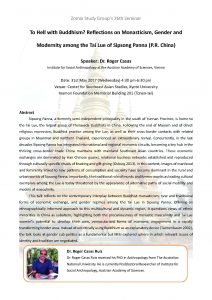 日時:2017年5月31日(水)16:30~18:30(16:00開場)
日時:2017年5月31日(水)16:30~18:30(16:00開場)
場所:京都大学東南アジア地域研究研究所 稲盛財団記念館2階 201号室「東南亭」
使用言語:英語
PROGRAM:
16:30-16:35 Introduction
16:35-17:35
“To Hell with Buddhism? Reflections on Monasticism, Gender and Modernity among the Tai Lue of Sipsong Panna (P.R. China)” by Dr. Roger Casas Ruiz (Institute for Social Anthropology at the Austrian Academy of Sciences)
17:35-17:50
Commentator: Dr. Tadayoshi Murakami (Osaka University)
17:50-18:30
Open Discussion
ABSTRACT:
Sipsong Panna, a formerly semi-independent principality in the south of Yunnan Province, is home to the Tai Lue, the largest group of Theravada Buddhists in China. Following the end of Maoism and of direct religious repression, Buddhist practice among the Lue, as well as their cross-border contacts with related groups in Myanmar and northern Thailand, experienced an extraordinary revival. Concurrently, in the last decades Sipsong Panna has integrated into national and regional economic circuits, becoming a key hub in the thriving cross-border trade China maintains with mainland Southeast Asian countries. These economic exchanges are dominated by Han Chinese guanxi, relational business networks established and reproduced through culturally specific rituals of feasting and gift-giving (Osburg 2013). In this context, images of manhood and femininity linked to new patterns of consumption and sociality have become dominant in the rural and urban worlds of Sipsong Panna. Importantly, the traditional role of monks and former monks as leading cultural exemplars among the Lue is today threatened by the appearance of alternative paths of social mobility and models of masculinity.
This talk reflects on the contemporary interplay between Buddhist monasticism, new and traditional forms of economic exchange, and gender regimes among the Tai Lue in Sipsong Panna. Offering an ethnographically informed approach to this multicultural and dynamic region, it questions views of ethnic minorities in China as subaltern, highlighting both the precariousness of monastic masculinity and Tai Lue women’s potential to develop their own, vernacularized forms of economic engagement in a rapidly transforming border area. Instead of uncritically using Buddhism as an explanatory device (Tannenbaum 2002), the talk looks at gender sub-politics as a fundamental but little explored sphere in which relevant issues of identity and tradition are negotiated.
————————————————————————–
Zomia Study Group contacts: Koichi Fujita, Hisashi Shimoo, Mio Horie (Center for Southeast Asia Studies, Kyoto University)